Gwen Ifill reports from Iowa on the 2nd Republican primary debate and the Ames Straw Poll. Joined by Dan Balz, The Washington Post, they look at the testy exchanges on the debate stage. Plus, in the Washington Week studio, Judy Woodruff examines the White House's response to recent troublesome economic news with John Harwood of CNBC/The New York Times and Jackie Calmes, The New York Times.
Full Episode: August 12, 2011
Nov. 03, 2014 AT 4:28 p.m. EST
TRANSCRIPT
Notice: Transcripts are machine and human generated and lightly edited for accuracy. They may contain errors.
MS. IFILL
: The Republican president campaign got its jumpstart here this week in Iowa, but the state pay rollercoaster had nothing on Wall Street. We’ll talk about the story from here and from there, tonight on “Washington Week.”
It must be getting serious.
REP. MICHELE BACHMANN (R-MN)
: I have a very consistent record of fighting very hard against Barack Obama and his unconstitutional measures in Congress. I’m very proud of that record.
GOV. TIM PAWLENTY
: She said she’s got a titanium spine. It’s not her spine we’re worried about. It’s her record of results.
MS. IFILL
: The candidates are sharpening their attacks.
FMR. GOV. MITT ROMNEY
: I predict in this place, on this day, in November of 2012, President Obama will not carry the state of Iowa.
MS. IFILL
: Leading up to the Iowa straw poll, the jockeying has begun. We see who will struggle and who will survive.
FMR. GOV. JON HUNTSMAN
: If you want to know what I’m going to do, I’m going to do exactly what I did as governor. It’s called leadership.
MS. IFILL
: The common target: President Obama, who spent the week pushing back against the tidal wave of bad economic news – a credit rating downgrade –
JOHN CHAMBERS
: The political brinkmanship we saw over raising the debt ceiling was something that was really beyond our expectations.
MS. IFILL
: – and a wild stock market.
PRESIDENT BARACK OBAMA
: In the aftermath of this whole debt ceiling debacle and with the markets going up and down like they are, there’s been a lot of talk in Washington right now that I should call Congress back early. The last thing we need is Congress spending more time arguing in D.C.
MS. IFILL
: A week when arguments mattered. Covering the story: Dan Balz, of the “Washington Post,” Jackie Calmes of the “New York Times,” and John Harwood of CNBC and the “New York Times”
ANNOUNCER
: Award-winning reporting and analysis, covering history as it happens, live from our nation’s capital, this is “Washington Week” with Gwen Ifill produced in association with “National Journal.”
(Station announcements.)
ANNOUNCER
: Once again, reporting from Iowa this week, Gwen Ifill
MS. IFILL
: Hello from Iowa, the summer kickoff to voting in the first caucus state next January. Tomorrow there’s a straw poll. Last night there was a debate. In between, we’re here at the Iowa State Fair with Dan Balz from the “Washington Post,” who’s been here with me all week trying to figure all of this out.
So Dan, as you’ve been here, what’s been the most amazing thing you’ve seen?
MR. BALZ
: Well, I mean, the debate, on Thursday night, was such a contrast to what we saw two months ago in New Hampshire. That was a sleepy debate. This was an eruption. We’ve been waiting for this race to kind of heat up, to get people engaged. And we saw that Thursday night. Almost everybody in the group had something to prove and they were going at one another in a way we have not seen up to now.
MS. IFILL
: Who needed to break out, was there someone who came with more to prove?
MR. BALZ
: Well, Governor Pawlenty from Minnesota clearly needs all the help he can get. His campaign has been struggling. The straw poll will be a big moment for him and I think he needed to take on Congresswoman Bachmann because she’s got more momentum. And so he came in with something to prove, but there were others, too. Governor Huntsman wanted to make an impression in his first debate. Newt Gingrich wanted to erase the idea that his campaign was totally floundering. And Governor Romney was able to kind of float mostly above the fray as he did in the previous debate.
MS. IFILL
: So did anybody pull it off, anybody who really wanted to do it pull it off?
MR. BALZ
: Well, I’m not sure there were any clear winners other than perhaps Governor Romney again because everyone else was focused on somebody else.
MS. IFILL
: Didn’t hurt himself.
MR. BALZ
: He did not hurt himself in the list, I don’t think, but he’s sitting there, worrying about Rick Perry, the governor of Texas, who’s going to get in on Saturday.
MS. IFILL
: Let’s talk about Rick Perry, the governor of Texas. It’s not like we didn’t know that he was seriously considering this, but his timing seems suspicious.
MR. BALZ
: Well, his timing is exquisite, if you will. I mean he made it clear on the day of the debate that he was going to announce on Saturday, just as the speakers begin to give their speeches in Ames on Saturday, he’ll be in South Carolina, drawing all the attention away, and then, on Sunday, after a quick trip to New Hampshire, he’ll be here in Iowa for a couple of days of campaigning.
MS. IFILL
: Who is – we’ve been sitting here at the State Fair. We’re right across from what they call the soap box, where all the candidates show up and talk to voters, and they’ve been doing it all week long. We’ve seen Sarah Palin here today. Michele Bachmann is across the street. Who is really touching the core with Iowa voters, can you tell?
MR. BALZ
: Well, I think you have to say that it’s Michele Bachmann. She – she got into this race late and immediately zoomed to either the top or near the top of the polls. She’s done very well here. This is a Republican electorate that likes fiscal conservatism and social conservatism. She’s tapped into the tea party. She’s tapped into evangelicals. She knows Iowa. She’s an Iowa native and she’s played that card hard. So that’s one of the reasons that Governor Pawlenty is worried. I mean, both of them need a victory in the Iowa caucuses to really establish themselves next year, and one of them is going to be disappointed tomorrow.
MS. IFILL
: You mentioned the social conservatives and the economic conservatives. A lot of Iowans say that we pay too much attention – people like you and me – to the social conservatives. Who wins the day, besides the band, who wins the day in contests like this?
MR. BALZ
: Well, in the past, the social conservatives have been a critical element. Mike Huckabee won the caucuses four years ago on the strength of his support from the social conservative part of the party. But a lot of those folks today are just as worried about economic issues as some of the social issues. So –
MS. IFILL
: Especially after the week we’ve just had.
MR. BALZ
: Right. I mean, we have a different environment this time than we’ve had in the past, so it’s not as clear cut.
MS. IFILL
: Let’s talk about expectations for the straw poll and whether the straw poll matters. There’s a lot of mixed debate about that, whether the straw poll is really that important or whether it’s just a showcase for the most committed, most engaged voters.
MR. BALZ
: Well, you can argue that the straw poll has kind of passed its prime. Here you have a case in which the frontrunner, Mitt Romney, is not actively competing. Rick Perry, who is very high in the polls, even though he’s not an official candidate, will be elsewhere. And you have some of the people who are well down in the polls actually competing. So what comes out of this? I mean, the other – the other reality of the straw poll, Gwen, is that somebody who doesn’t do as well as they are expected to do could find themselves threatened with being driven out of the race. And it’s unclear whether an event like this should have that kind of power.
MS. IFILL
: Well, and there are people like Herman Cain, the former CEO of Godfather’s Pizza and Ron Paul, the libertarian candidate, who have a lot of passionate supporters in a state like Iowa, who could turn things upside down.
MR. BALZ
: Certainly Ron Paul could. I mean, there’s every expectation that Ron Paul will be in the hunt to lead in the straw poll on Saturday. As you say, his followers are very passionate. He has a great record in straw polls because it’s a small group of people who turn out. Now, in Ames, I mean, the numbers of people are significantly larger than in some of the straw polls elsewhere. There were 14,000 last time and there were 23,000 the time before. So it’s a different animal. But Herman Cain has support in this state and Rick Santorum – I mean, we can’t overlook Rick Santorum. He’s got support.
MS. IFILL
: He’s been to 68 counties I think he said in the last few weeks.
MR. BALZ
: He said that in the debate and he has been all over the state in the last few weeks.
MS. IFILL
: How many of these have you been to, have you covered?
MR. BALZ
: Well, I think the first straw poll I attended was probably the 1990 – may have been 1988 or even 1987.
MS. IFILL
: So you’ve been around the block on these a couple of times.
MR. BALZ
: I have been to Ames for a number of these.
MS. IFILL
: Does this feel different?
MR. BALZ
: Well, it does feel different. I think that the – I think the combination of the debate on Thursday night and the straw poll and the state fair, obviously, opening right in the middle of that, has drawn a bigger crowd of all of us, and so the attention to this event is somewhat or significantly higher than we’ve seen in the past.
MS. IFILL
: Dan, as always, thank you so much. That’s it from here. I will be back at the end of the program with a few of my final thoughts, but until then my friend and colleague Judy Woodruff of the PBS “NewsHour” will take it in Washington.
MS. WOODRUFF
: And thank you, Gwen. And while you’re enjoying the Iowa State Fair and covering the candidates, we are here in Washington keeping an eye on the other stories of the week. We have seen a rollercoaster in the markets, first sparked by the downgrading of the U.S. credit rating by Standard & Poor’s, which provoked a harsh response from the president.
PRES. OBAMA
: On Friday, we learned that the United States received a downgrade by one of the credit rating agencies, not so much because they doubt our ability to pay our debt if we make good decisions, but because after witnessing a month of wrangling over raising the debt ceiling, they doubted our political system’s ability to act. This is the United States of America. No matter what some agency may say, we’ve always been and always will be a AAA country.
MS. WOODRUFF
: What followed was an up and down stock market, driven by deficit concerns, anxiety over Europe’s economy, and some mixed economic news here at home. Welcome, Jackie. Welcome, John. But John, let’s start with this S&P announcement. With a week of hindsight, any better sense of why they did it?
MR. HARWOOD
: Fundamentally, Judy, it was political. Standard & Poor’s, early in the spring, looked at the amount of deficit reduction that major players were talking about, the Simpson-Bowles Commission, the Paul Ryan budget in the House, what President Obama put out in his own framework was about $4 trillion over 10 years. And they said, okay, that’s the benchmark. If they achieve the $4 trillion over 10 years, then we will consider that a sound result and preserve the AAA.
They were alone in setting that standard. The two other major agencies, Moody’s and Fitch, did not set that standard. Then you had this torturous political process over this summer that culminated in the deal. Everyone else seemed to blow with the political winds once that happened. People assumed a somewhat more optimistic view -- well, at least they got a deal. We didn’t default. Now, they’ve got a special committee to come up with more savings. Standard & Poor’s said, no, look how messy that process was. We’re going to downgrade you. And the interesting thing was the administration was critical of their decision, but President Obama has been repeating many of those same criticisms of the political process trying to turn them against Republicans.
MS. WOODRUFF
: Because he wanted a bigger deal in the first place, too, and was not able to get it. And –
MR. HARWOOD
: Exactly. And he wants to pin that on Republicans. To some degree, Standard & Poor’s did, too. They pointed in their report to the intransigence of Republicans on being willing to raise any revenue as part of a deal as why they saw the political system as gridlocked. And so you – in some ways, the administration was affronted and outraged by this. Tim Geithner attacked them; so did the president. But they also echoed some of the arguments that S&P made.
MS. WOODRUFF
: Jackie, why was the White House so upset, when as John said – I mean they – they wanted a bigger deal, too?
MS. CALMES
: Well, it’s interesting. When the news first came out last Friday night, by Saturday, the White House was staying fairly quiet. They put out a statement, but they didn’t want to pile on. Only, you know, speaking on background were officials complaining about the decision, not least that Standard & Poor’s made a $2 trillion mistake. Now, when you’re looking for a $4 trillion end result, a $2 trillion mistake is not minor. So then the rationale became this political one. But by Monday, you know, the president and the others were far more critical. But just like John said, they picked up on the argument that Standard & Poor’s was making about political dysfunction.
MS. WOODRUFF
: But they ended up looking, as some people – as I heard some people say – defensive in all of that. Was that – that wasn’t their intention.
MS. CALMES
: I wouldn’t think so, but it’s hard not to be defensive when, for the first time in history a ratings agency downgrades the United States credit on your watch. But you know, just to pick up on what John said, you know, so you saw on Ames, Iowa, in the debate last night that a lot of the Republicans have continued to hit on this as being Barack Obama’s downgrade. But one of the things it says in that report that hasn’t gotten – in Standard & Poor’s report that hasn’t gotten much attention is the fact that they said, in addition to their downgrading from AAA to AA+, and there’s a negative outlook for the United States future credit rating, they said that a big part of their assumption in doing this was the fact that they assume that the Bush era tax rates for the high earners would continue because Republicans won’t let them expire on schedule. They said if those did expire on schedule at the end of 2012, their outlook might – they might raise the outlook from negative to stable.
MS. WOODRUFF
: So they sort of dangled that. So John, the stock market reaction has just been crazy this week. It’s been way up hundreds of – down 600, up 400, down 500, up – end of the week a little bit up, but – but is that all due to the downgrade by Standard & Poor’s?
MR. HARWOOD
: No. And look, a lot of it is hard for any of us to explain. It’s the most volatile stock market that I’ve seen. First of all, you had – Alan Greenspan, last weekend said fundamentally this was not a credit event; this is a blow to the American psyche. So everyone was processing that. I think the market was processing that on Monday. At the same time, we’ve seen declining consumer confidence, declining business confidence, weakness in Europe, in the European banking system. They’ve got their own full blown debt crisis there.
MS. WOODRUFF
: And that’s having an effect here.
MR. HARWOOD
: Exactly. So the market goes down, then it recovers. The Fed acts on in the middle of the week and Ben Bernanke said we’re going to keep rates low for two years. Initially, it was funny to watch the ticker as they were releasing that announcement. First the market went down, then it went way up, then the next day went down again.
MS. WOODRUFF
: And behind the Fed’s decision, Jackie, it’s interesting because they essentially projected two years of a weak economy. And so they said we’re going to keep interest rates low. What cemented that view because it wasn’t so long ago the Fed was saying, we’re not really sure whether things are going to turn around or not?
MS. CALMES
: Well, it’s become pretty clear that you’re going to have continued high unemployment. You know, we’ve all known from the beginning pretty much that this was a downturn driven by a financial crisis. They’re always slow. It’s slow getting out of them. And employment lags. But it’s become – in the course of the recovery there’ve been these other headwinds that keep coming at us. In 2010, it was the Greek debt crisis and other things, the Japanese tsunami, the new – the latest Euro crisis. So it’s become – with the passage of time, it’s clear that this is going to continue to be a downturn. Both the Fed’s monetary policy and Congress’ fiscal policy are – there’s limits to what they can do.
MS. WOODRUFF
: Then, John, that leaves the president in a box. I mean, he’s getting – the Republicans are screaming that he’s not doing what they want him to do. The Democrats are saying he’s giving in too much. Where does that lead?
MR. HARWOOD
: Well, he’s in a terrible bind politically because the unemployment rate, which previously the administration said would get down to about 8 percent by Election Day – now few people think it’s going to get that low. Instead of looking at 3, 3.5 percent growth for the next year and a half, much lower growth. So the president’s got to sit there and say, what can I do to stimulate the economy and what can I propose that Republicans will accept? He’s looking at things like expanded payroll tax cuts. Has been a Republican idea in the past, but Republicans are cool to it now. Other forms of stimulus for business – new higher tax credit. He’s got an infrastructure bank, $50 billion, has a lot of bipartisan support for that idea, but Republicans right now aren’t interested in anything that involves direct spending by the government.
So I think hopes within Washington for some kind of a stimulus package are pretty low. Something will probably pass, but it will be much smaller than most economists think is necessary for the scale –
MS. WOODRUFF
: And Jackie, the president announced this week that he’s not going to call the Congress back. He said something to the effect that’s a last thing the American people want right now is for Congress to be here squabbling. Did they even consider doing that?
MS. CALMES
: I don’t think so. I haven’t found any evidence that they did. And – because they know, it’s just going to look worse if Congress comes back because there is no quick fix. In fact, when they come back, we know because of this deficit reduction deal that cleared the way for the debt limit to rise, that we’ve now got this select committee, 12 people – six Republicans, six Democrats – that is supposed to come up with recommendations for an additional $1.2 to $1.5 trillion in savings. And they’re supposed to do so by November 23
rd
.
You know, it’s going to be hard enough. And the hopes are fairly low if nonexistent for this committee. So the idea – you know, for them to finish by November 23
rd
– the idea that Congress could do anything constructive in the month of August is beyond farfetched.
MR. HARWOOD
: Judy, I think the practical reality inside the White House was as hard stopping it as it was for investors to look at the Dow going up and down; it was the same inside the White House. Market goes down, high anxiety. Market goes up; glass of wine, everybody’s feeling a little bit more relaxed. And I think to the extent that the market would have kept going down, then you might have had a situation where it felt like more of an emergency. You’d call Congress back. But in the absence of that, when things seemed by the end of the week to stabilize, as the president said, what good is it going to do to call them back and argue some more and not pass anything?
MS. WOODRUFF
: Well, it does seem at this point, Jackie, that any hopes that there are are pinned on this so-called select super committee, they’re calling it.
MS. CALMES
: Right.
MS. WOODRUFF
: What are we to make of the people who were chosen for that by the congressional leadership?
MS. CALMES
: Well, they’re all, the Democrats and Republicans, party loyalists, fairly high ranking, you know, committee chairmen or leadership figures. Several have been on this kind of committees before, whether the Bowles-Simpson Fiscal Commission last year or the more recent talks that Vice President Joe Biden headed that were sort of a preliminary to this deal they cut to raise the debt limit. So these are people, most of them who have experience at this. It begs the question why do we need another committee? Well, just to – it was just a way to get a deal. And so – but hopes are very low. They do have to come up with something, though.
MS. WOODRUFF
: And I just want to pick up on – you’ve done some interesting reporting this week, Jackie. You’ve been talking to Republicans out there, not the ones who were sitting in Congress, but who were saying there does need to be a balanced package.
MS. CALMES
: Well, this has been true most of this year. You can go back to last year. And – but it really has gotten legs recently as the markets and the economy have shown such weakness and volatility. What you’ve had or what’s been striking is the number of macroeconomists, private sector economists and forecasters, and major Republican figures in the old days, standard bearers for Republican economics philosophy who are saying that sort of the three main things that the current Congressional Republicans stand for are the wrong medicine. And that is we need a stimulus now, but in the long term we need to bring down the debt, but the tax – and that should include tax increases which Republicans are against, and spending cuts.
MS. WOODRUFF
: And this is people like Martin Feldstein, who worked for President Reagan –
MS. CALMES
: Exactly. Hank Paulson, who was treasury secretary under George Bush; Pete Domenici, who ran the Budget Committee in the Senate for years.
MS. WOODRUFF
: And John, but only in less than a minute, are these ideas that people elected to office are likely to adopt?
MR. HARWOOD
: I think to some degree. I do expect that at the end of the day, either moving separately or with the special committee, some action will be taken to spur economic growth. I think it’s going to be difficult for members of Congress to be home in their districts while people are so anxious about their economic futures to come back and say, we’re not going to take any steps. All we’re going to do is cut.
But we’ll see. We’ve seen that certainly this new contingent in the Congress, very conservative, has been resistant to a lot of the normal political pressures that we’ve been used to covering over the years.
MS. WOODRUFF
: And maybe back home in the districts they’ll hear a message and they’ll come back and think differently. We’ll see.
MR. HARWOOD
: Exactly.
MS. WOODRUFF
: Jackie Calmes, John Harwood, thank you both. That is all the time we have for now. We are leaving a little early tonight to give you the opportunity to support your local PBS station, which in turn supports us. I’m Judy Woodruff in Washington warming the seat for you, Gwen, while you enjoy the state fair.
MS. IFILL : Thanks, Judy. Follow “Washington Week” and the PBS “NewsHour” online for all your straw poll results all weekend and for more on Rick Perry’s announcement for president. In the meantime, I want to go find a corn dog. I love Iowa. See you next week on “Washington Week.” Good night.
FROM THIS EPISODE


Full Episode: March 18, 2011
President Obama and the U.N. warn Moammar Gadhafi to stop military action against rebels or face consequences. Meanwhile, after the earthquake, tsunami and partial nuclear plant meltdown in Japan, the U.S. reviews nuclear safety and a look at the global economic impact of the disaster. Joining Gwen, Tom Gjelten, NPR, Coral Davenport, National Journal, and David Wessel, Wall Street Journal.


Full Episode: April 1, 2011
Encouraging new unemployment figures arrive as Congress debates the budget and tries to avoid a government shutdown. Also, the U.S. hands over some military control in Libya to NATO. Plus, the panel looks at the 2012 GOP hopefuls. Joining Gwen Ifill: Yochi Dreazen, National Journal; Greg Ip, The Economist; Naftali Bendavid, The Wall Street Journal; and Karen Tumulty, The Washington Post.

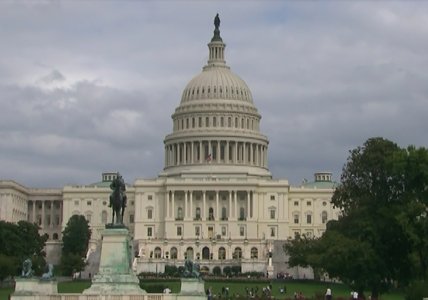
Full Episode: April 8, 2011
With a $39 billion spending cut agreed upon, the possibility of a government shutdown is finally over. The panel discusses why leaders of neither side wanted a shutdown in the first place, and how their constituents may feel. Joining Gwen Ifill: John Dickerson, Slate Magazine/CBS News; Michael Duffy, TIME Magazine; and Jeanne Cummings, Politico.

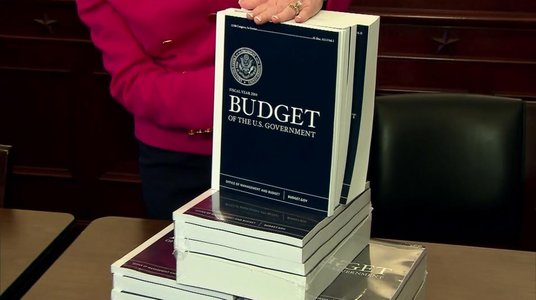
Full Episode: April 15, 2011
While President Obama and Rep. Paul Ryan both unveiled plans to cut $4 trillion from the national debt they continue to argue over how to do it. The GOP and Democrats continued to fight over America's deficit, from taxes to overhauling Medicare and Medicaid. This week: Susan Davis, National Journal; Jeff Zeleny, New York Times; Janet Hook, Wall Street Journal; John Harwood, CNBC/NY Times.

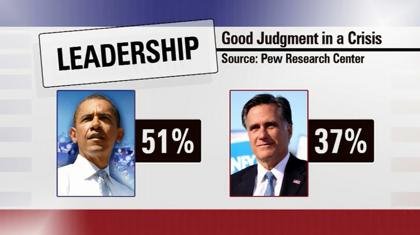
Full Episode: April 22, 2011
With gas prices on the rise, an S&P report lowering America's credit outlook, continuing debate over the deficit and a stalemate in Libya, President Obama's approval numbers have declined just at the moment he launched his reelection campaign. Joining Gwen tonight: David Wessel/Wall Street Journal; Coral Davenport/National Journal; Dan Balz/Washington Post and Martha Raddatz/ABC News.


Full Episode: May 6, 2011
After U.S. forces kill Osama bin Laden, America rejoices but the war on terror continues. The panel looks at the intelligence that led to bin Laden, the political and national security impact, and the strained US-Pakistan relationship. Joining guest host, Gloria Borger: James Kitfield, National Journal, Tom Gjelten, NPR, Peter Baker, New York Times, and Charles Babington, AP.


Full Episode: May 13, 2011
The impact of Osama bin Laden's death continues to ripple, straining the U.S.'s relationship with Pakistan. After a bump in the polls, Obama returns to domestic policy while the GOP presidential field adds a few more candidates. Joining Gwen: David Sanger, New York Times; Nancy Youssef, McClatchy Newspapers; John Dickerson, Slate/CBS News; Dan Balz, Washington Post.

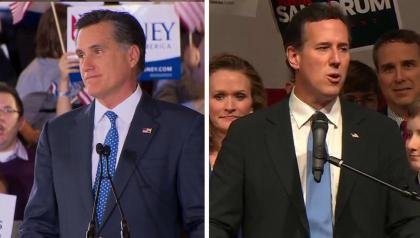
Full Episode: May 20, 2011
After infighting between New Gingrich and fellow republicans, the panel examines the current field of GOP candidates. Also, the table reports on campaign fundraising efforts, the scandal rocking the IMF, and the President's clash with Israel's PM on the path to peace in the Mideast. Joining Gwen: Jeanne Cummings/POLITICO, Michael Duffy/TIME, Doyle McManus/Los Angeles Times, Eamon Javers/CNBC.

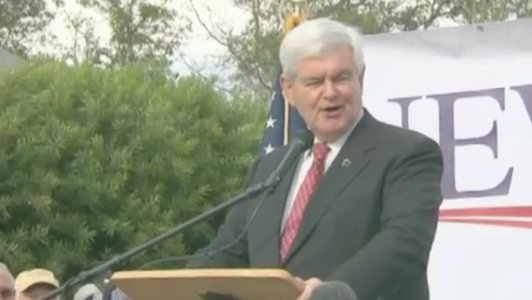
Full Episode: June 10, 2011
As his top staff resigns, Newt Gingrich's presidential ambitions seem to falter while Democrats distance themselves from Rep. Anthony Weiner after he confessed to sexually explicit online activity. Also, a report on the future of Afghanistan as U.S. troops get set to withdraw. Joining Gwen: James Kitfield, National Journal; John Dickerson, Slate/CBS News; and Karen Tumulty, Washington Post.


Full Episode: June 17, 2011
Analysis of the 2nd GOP Presidential debate, and a new fact check feature 'Just the Facts.' Plus, details of VP Biden's negotiations on raising the debt ceiling. Also, the Pentagon and Defense Dept post-Robert Gates & controversy over the US involvement in Libya. Joining Gwen: Michael Duffy, Time; Nancy Youssef, McClatchy Newspapers; Dan Balz, Washington Post; and Jim Barnes, National Journal.


Full Episode: June 24, 2011
President Obama's announcement to begin drawing down U.S. troops from Afghanistan and what it means; the impact on class action suits because of the Supreme Court's Wal-Mart decision; and the latest on the growing GOP presidential field. Joining Gwen: Martha Raddatz, ABC News; Doyle McManus, Los Angeles Times; Nia-Malika Henderson, Washington Post; and Pete Williams, NBC News.

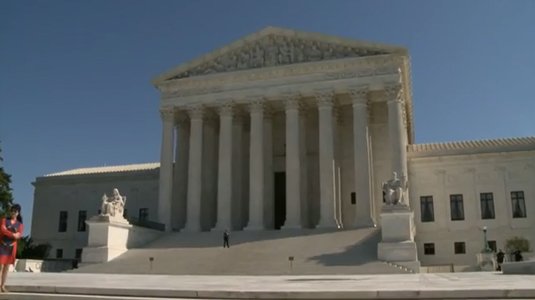
Full Episode: July 1, 2011
What will the global economic implications be if Congress does not raise the nation's $14.3 trillion debt limit? Also, Bachmann launched her presidential campaign. Plus, SCOTUS' ruling on the sale of violent video games to children. Joining Pete Williams: David Wessel of The Wall Street Journal; Major Garrett of National Journal; Jeff Zeleny of The New York Times; and Joan Biskupic of USA Today

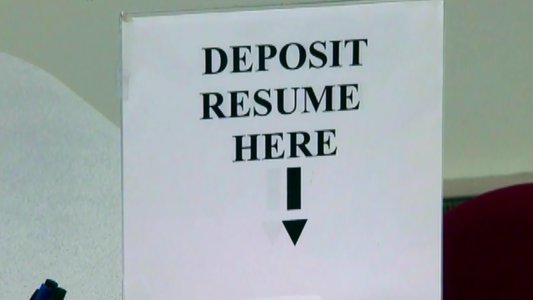
Full Episode: July 8, 2011
Discouraging June unemployment numbers help to frame the contentious debt ceiling negotiations. A look at GOP presidential hopefuls and their fundraising, and the White House changes course on acknowledging suicides in the military.


Full Episode: July 15, 2011
President Obama predicts economic "Armageddon" if the debt ceiling isn't raised by the Aug 2 deadline. Democrats want tax hikes. Republicans want spending cuts. Gwen Ifill drills down on the facts & fiction surrounding the budget crisis with Michael Duffy, TIME Magazine; Gloria Borger, CNN; John Dickerson, Slate Magazine/CBS News; David Wessel, The Wall Street Journal.


Full Episode: July 29, 2011
Lawmakers prepare to work through the weekend to reach a debt deal and avoid a U.S. default. What will it take to break the stalemate and how would a default impact Americans? Plus, how Obama, Boehner, and Reid have played it so far. Joining Gwen Ifill: Major Garrett, National Journal; Jeanne Cummings, Bloomberg News; David Wessel, The Wall Street Journal; and Karen Tumulty, The Washington Post.


Full Episode: August 5, 2011
The economy is the worst it's been in years. Why and how did we get to this point? Also, with all the infighting in Washington these past 3-months, how did the debt deal come together and how will it effect the 2012 elections? Also, voter confidence and its impact on the polls. With Michael Duffy, Time; Deborah Solomon, The Wall Street Journal; and Charles Babington, Associated Press.

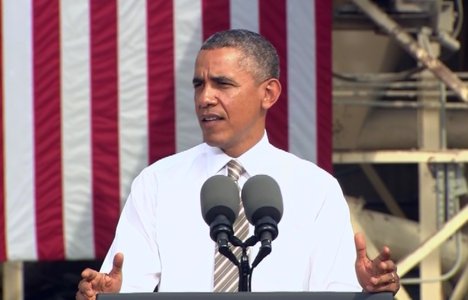
Full Episode: September 16, 2011
President Obama took his jobs plan straight to voters this week amidst a bounty of bad news including a jump in unemployment benefit applications, and a spike in the number of people living in poverty. And analysis of the Tea Party debate. Joining Gwen Ifill: John Dickerson of Slate/CBS News, Beth Reinhard of National Journal, Charles Babington of AP, Michael Fletcher of The Washington Post.

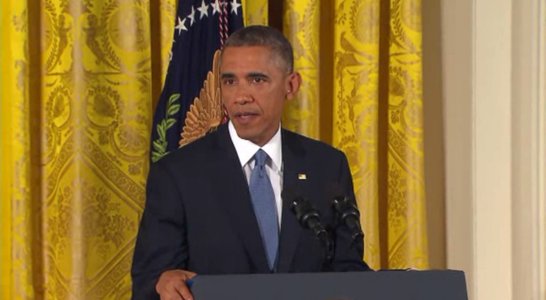
Full Episode: September 23, 2011
President Obama unveils his deficit reduction plan, with new taxes and spending cuts. Plus, Congress argues over disaster relief and a possible government shutdown. Also, Palestinians appeal for full membership at the UN. And the GOP presidential candidates debate.

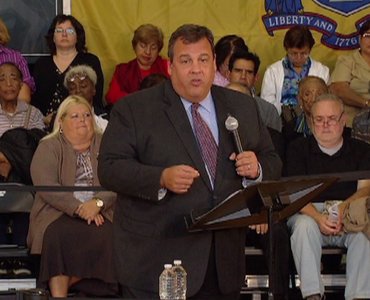
Full Episode: September 30, 2011
Airstrikes killed Anwar al-Awlaki, a U.S.-born Al-Qaeda leader in Yemen. At home, dissatisfied GOP voters want Gov. Chris Christie to join the presidential race. Also, President Obama feuds with his base. Plus, a stopgap bill temporarily prevents a government shutdown. Joining Gwen: John Dickerson, Slate/CBS News; Sam Youngman, The Hill; Major Garrett, National Journal; Pierre Thomas, ABC News.

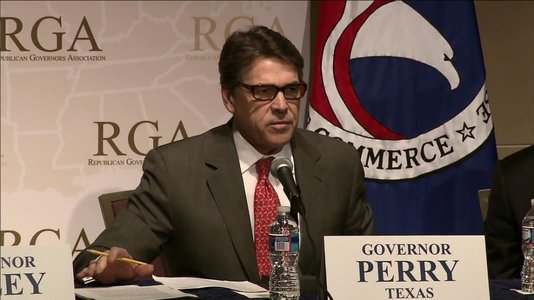
Full Episode: October 14, 2011
As the GOP candidates debate economics, President Obama promotes his jobs plan. But with its defeat in the Senate, what's next? Also, the strange story of an assassination plot against a Saudi Ambassador involving Iran and a Mexican drug cartel. Joining Gwen: Karen Tumulty, Washington Post; Michael Duffy, TIME; Alexis Simendinger, RealClearPolitics; James Kitfield, National Journal.

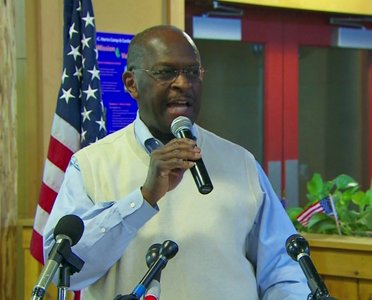
Full Episode: October 28, 2011
A long shot a short time ago, Herman Cain is shaking up the GOP race. But rising polls numbers brings greater scrutiny. And what happened to Rick Perry's surge? Also, the President tries to bypass Congress. Plus the clock is ticking on the Deficit Reduction Committee. Joining Gwen: John Dickerson, Slate/CBS News; John Harwood, CNBC/NY Times; Jackie Calmes, NY Times; Janet Hook, Wall St. Journal.


Full Episode: November 4, 2011
Alleged harassment scandals continue to dog Republican presidential frontrunner Herman Cain, as the other GOP candidates consider how to handle the controversy. Plus a discussion on the global economy, Greece, the G20 meetings, and new U.S. job numbers. Joining Gwen: John Harris, Politico; Chuck Babington, Associated Press; Alexis Simendinger, RealClearPolitics; Jim Tankersley, National Journal.

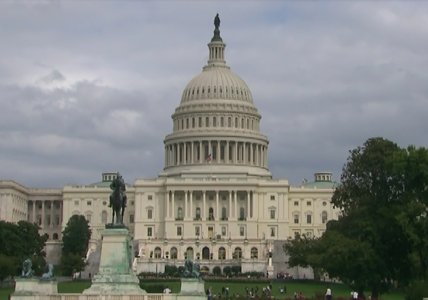
Full Episode: November 18, 2011
As the GOP candidates debated foreign policy, President Obama met with Asia-Pacific leaders. Newt Gingrich's bumpy climb in the polls. And, what happens if the Super Committee fails to deliver? Plus, SCOTUS to decide constitutionality of health reform. Joining Gwen: Major Garrett, National Journal; Jeanne Cummings, Bloomberg News; Lori Montgomery, The Washington Post; Joan Biskupic, USA TODAY.


Full Episode: December 23, 2011
This week, we look back at 2011 and forward to 2012. We'll analyze battles between Congress and the President, the economy, the killing of Osama bin Laden, the pullout of US troops in Iraq while fighting continues in Afghanistan, and more. Joining Gwen: Helene Cooper, New York Times; Michael Duffy, Time Magazine; Doyle McManus, Los Angeles Times; David Wessel, Wall Street Journal.

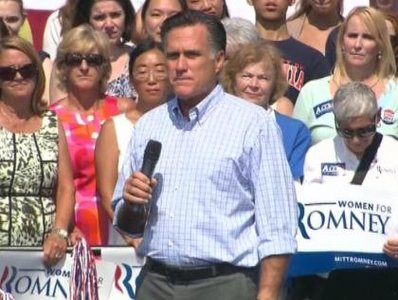
Full Episode: December 30, 2011
Four days before the Iowa Caucuses, Mitt Romney and Ron Paul lead, but Rick Santorum may surprise come voting day. Plus, how will Congressional retirements affect Democrats' efforts to retain control of the Senate in 2012? Joining Gwen from Iowa: Karen Tumulty, The Washington Post; Jeff Zeleny, The New York Times. Around the table: Christina Bellatoni, CQ Roll Call; Susan Davis, USA Today.

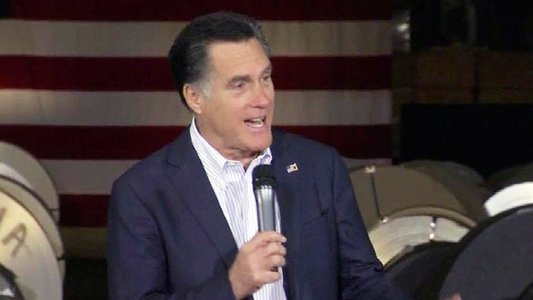
Full Episode: Januuary 6, 2012
This week, we're on the ground in Manchester, New Hampshire to preview the primaries. After a close finish in Iowa, will Mitt Romney stay ahead of the pack in the Granite State? Joining Gwen: Dan Balz, Washington Post; John Dickerson, Slate Magazine and CBS News; Julianna Goldman, Bloomberg News; John Harwood, CNBC and The New York Times.


Full Episode: January 13, 2012
Will Mitt Romney's momentum from successive wins in Iowa and New Hampshire help him win South Carolina? Plus, the Supreme Court will decide on the FCC's authority to regulate the airwaves, and President Obama's aims to shrink government. Joining Gwen: Beth Reinhard, National Journal; Jeanne Cummings, Bloomberg News; Alexis Simendinger, RealClearPolitics.com; Pete Williams, NBC News.

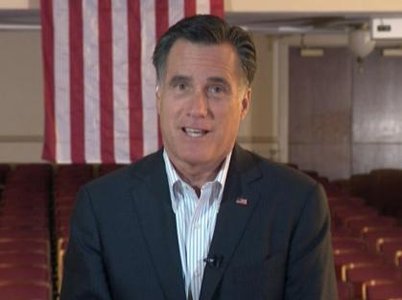
Full Episode: January 27, 2012
Ahead of next week's Florida Republican primary, the 4 remaining candidates squared off on the ground and in two debates. Plus, following his State of the Union Address, President Obama hit the road to push his economic and jobs plan. Joining Gwen: Dan Balz, The Washington Post; John Dickerson, Slate Magazine & CBS News; Jackie Calmes, The New York Times; David Wessel, The Wall Street Journal.


Full Episode: February 3, 2012
What do January's unemployment numbers tell us about the economy? Plus, Mitt Romney won the Florida primary, but his comments about the poor are making headlines. Also, new FEC disclosures shine light on Super PAC money. Joining Gwen: Karen Tumulty, Washington Post; John Harwood, CNBC and New York Times; Doyle McManus, Los Angeles Times; Jim Tankersley, National Journal.


Full Episode: February 17, 2012
As the GOP presidential primary race between Rick Santorum and Mitt Romney tightens, the panel previews the Arizona and Michigan primaries. Plus, President Barack Obama's proposed budget, a deal to extend payroll tax cuts, and tensions over Iran's nuclear program. Joining Gwen: Karen Tumulty, Washington Post; Jackie Calmes, New York Times; Susan Davis, USA Today; Martha Raddatz, ABC News.

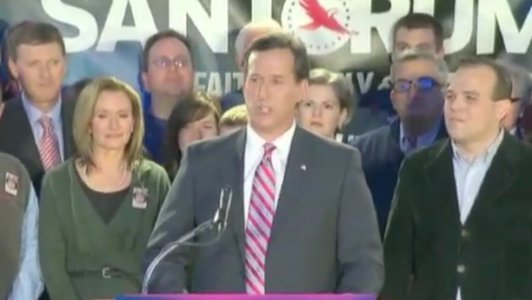
Full Episode: February 24, 2012
Rick Santorum is the main target in the GOP race as 13 states prepare to vote between now and Super Tuesday. Plus, international leaders meet in Tunisia to prevent more bloodshed in Syria. And unrest continues in Afghanistan after the burning of Qurans. Joining Gwen: Michael Duffy, TIME Magazine; Jeanne Cummings, Bloomberg News; Nancy Youssef, McClatchy; Yochi Dreazen, National Journal.

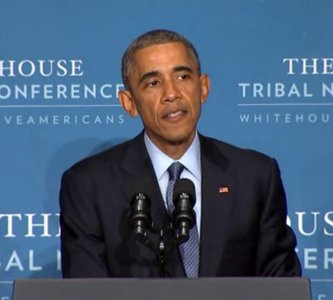
Full Episode: March 2, 2012
As we head into Super Tuesday, which GOP candidate has momentum and how will Tuesday's primaries change the race? Meanwhile, President Obama makes campaign-like speeches in Michigan and New York. Also, Senator Olympia Snow resigns, saying there is no longer bipartisanship in Congress. Joining Gwen: John Dickerson, Slate/CBS News; Gloria Borger, CNN; Charles Babington, Associated Press.


Full Episode: March 30, 2012
The Supreme Court heard three days of arguments on the 2010 Affordable Care Act. What were the key issues before the court? Plus, a mic catches a private comment between President Obama and Russian President Medvedev. Also, Mitt Romney's latest endorsements and the GOP race. Joining Gwen: Joan Biskupic, Reuters; Pete Williams, NBC News; Jeff Zeleny, New York Times; Julianna Goldman, Bloomberg News

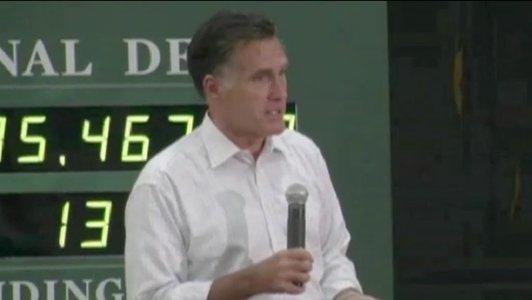
Full Episode: April 6, 2012
After three big wins Mitt Romney has scored more than half of the delegates needed for the GOP presidential nomination. Plus, new unemployment numbers shed light on the economy. Also, female voters, the President's Supreme Court remarks and more. Joining Gwen: John Dickerson, Slate Magazine/CBS News; Karen Tumulty, Washington Post; Jackie Calmes, New York Times; David Wessel, Wall Street Journal.

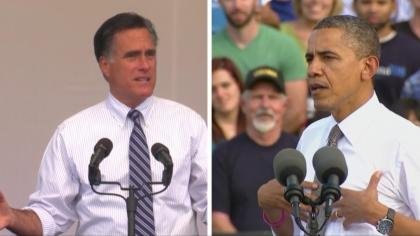
Full Episode: April 27, 2012
As the campaigns look ahead, Mitt Romney targets Barack Obama, but he is targeting youth voters. The Supreme Court hears arguments on Arizona immigration law. Also, a year after Osama bin Laden's death, balancing terrorism and civil liberties. Joining Gwen: John Dickerson, Slate Magazine/CBS News; Alexis Simendinger, RealClearPolitics; Pete Williams, NBC News; James Kitfield, National Journal.


Full Episode: May 4, 2012
The U.S. and China continue to negotiate over activist Chen Guangcheng's travel to America. Plus, President Obama visited Afghanistan on the one year anniversary of Osama bin Laden's death. Also, new unemployment numbers and the 2012 presidential race. Joining Gwen: Martha Raddatz, ABC News; Peter Baker, New York Times; David Wessel, Wall Street Journal; Charles Babington, Associated Press.


Full Episode: May 11, 2012
What's the political fallout of President Obama's support for same-sex marriage? Plus, longtime Senator Richard Lugar, R-Ind., lost his party's primary. What does that mean for moderate republicans and incumbents? Also, the double-agent al-Qaeda plotter. Joining Gwen: Major Garrett, National Journal; John Dickerson, Slate Magazine & CBS News; Susan Davis, USA Today; Pierre Thomas, ABC News.


Full Episode: June 1, 2012
What do disappointing job numbers mean for the already unemployed and the state of economic recovery? Mitt Romney wins enough delegates to make him the unofficial Republican nominee and finds himself in a dead heat with President Obama in three key swing states. Plus the latest on the crisis in Syria.

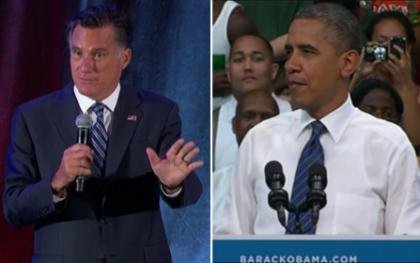
Full Episode: June 22, 2012
Mitt Romney and President Obama court Latino voters as immigration politics enters the spotlight. Plus, Obama invokes executive privilege as Attorney General Eric Holder faces a contempt of Congress charge. Also, what’s Europe’s economic future? This Week: Jeff Zeleny, New York Times; Laura Meckler, Wall Street Journal; Major Garrett, National Journal; Doyle McManus, Los Angeles Times.

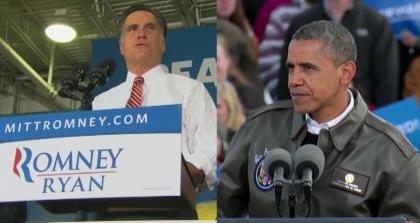
Full Episode: July 6, 2012
President Barack Obama campaigns in Ohio and Pennsylvania and accuses Romney of outsourcing jobs during his time at Bain Capital. Meanwhile, Mitt Romney says that the federal health care mandate is indeed a tax. Plus, new unemployment numbers. Joining Gwen: Dan Balz, The Washington Post; Jan Crawford, CBS News; Charles Babington, Associated Press; Amy Walter, ABC News.

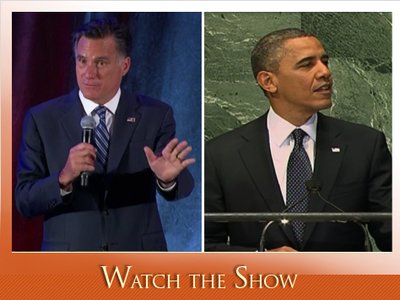
Full Episode: July 13, 2012
This Week, President Barack Obama and Mitt Romney both campaigned in battleground states. Obama called for an extension of middle class tax cuts while Romney addressed the NAACP. Also, House Republicans voted to repeal the president's health care law. Joining Gwen: Michael Duffy, TIME Magazine; Lori Montgomery, The Washington Post; Alexis Simendinger, RealClearPolitics; Sam Youngman, Reuters.


Full Episode: July 20, 2012
A horrific mass shooting at a movie theatre near Denver, Colorado. The campaigns talk about tax history and economic policy as attack ads from both campaigns intensify. And the fighting in Syria spreads to Damascus as the rebels achieve new victories. Joining Gwen: Pierre Thomas, ABC News; Karen Tumulty, The Washington Post; Jeff Zeleny, The New York Times; Doyle McManus, Los Angeles Times.

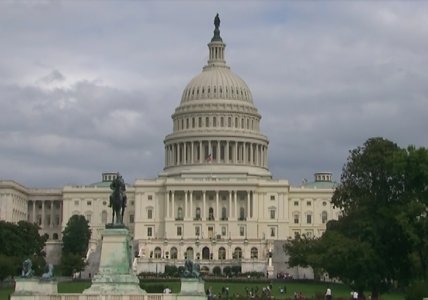
Full Episode: August 3, 2012
Mitt Romney and President Obama rally undecided voters in battleground states. The Tea Party scores a big victory in Texas with Senate nominee Ted Cruz. Plus July jobs numbers and Congress starts its summer recess with key legislation left undone. Joining Gwen: Amy Walter, ABC News; Karen Tumulty, The Washington Post; David Wessel, The Wall Street Journal; Susan Davis, USA Today.


Full Episode: August 10, 2012
New polls show that the presidential race is as close as ever. Mitt Romney and President Barack Obama campaign in key swing states as the campaigns and super PACs release more controversial advertisements. Also, when will Romney pick his running mate? Joining Gwen: Jeff Zeleny, The New York Times; Beth Reinhard, National Journal; John Harwood, CNBC and The New York Times.


Full Episode: August 17, 2012
Mitt Romney’s campaign received a jolt after announcing his running mate, Rep. Paul Ryan. Both campaigns came out swinging with new attacks ranging from policy to personal. Will Paul Ryan’s addition to the campaign change the direction of election? Joining Gwen: Jackie Calmes, The New York Times; Alexis Simendinger, RealClearPolitics; John Harris, POLITICO.


Full Episode: August 24, 2012
A Special Washington Week from St. Petersburg, Florida ahead of the Republican National Convention. How did the Mitt Romney campaign attempt to remain on-topic amidst the Todd Akin debacle? Why are the candidates sparring over Medicare again? Joining Gwen: Dan Balz, Washington Post; Beth Reinhard, National Journal; John Dickerson, Slate and CBS News; Amy Walter of ABC News.


Full Episode: August 31, 2012
Special Washington Week from Charlotte, North Carolina: Did Mitt Romney fulfill expectations at Republican National Convention? Plus what affect did Clint Eastwood's unscripted speech have? Also, we preview the Democratic National Convention. Joining Gwen: Jeff Zeleny, New York Times; Karen Tumulty, Washington Post; Alexis Simendinger, Real Clear Politics; John Hardwood of CNBC / New York Times.

© 1996 - 2026 WETA. All Rights Reserved.
PBS is a 501(c)(3) not-for-profit organization
